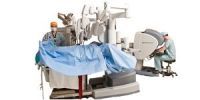Article
Robotic Prostate Surgery Raises Unrealistic Recovery Expectations
Author(s):
Most men who undergo robotic prostate surgery believe they will spend less time in the hospital and return to sexual functionality more quickly than if they had traditional surgery, despite a lack of conclusive evidence supporting these beliefs, researchers at Duke University Medical Center have found.

Most men who undergo robotic prostate surgery believe they will spend less time in the hospital and return to sexual functionality more quickly than if they had traditional surgery, despite a lack of conclusive evidence supporting these beliefs, researchers at Duke University Medical Center have found.
In the United States, a majority of prostate surgeries are performed by a surgeon sitting at a console that controls robotic arms, which extract the prostate gland through tiny cuts in the patient’s abdomen.
The researchers questioned 171 men on their expectations from prostate cancer surgery prior to the procedure. Of the 97 men who were undergoing robotic surgery, 89% said they expected to stay in the hospital for just a single night, compared with 37% of those undergoing traditional surgery.
Members of the robotic surgery group also believed they would be able to return to exercise in about five weeks, while the men who chose traditional surgery expected to return to exercise after six weeks. Further, members of the robotic surgery group believed they would regain erectile function within five months of surgery, far sooner than the nine-month wait anticipated by those in the traditional surgery group.
On average, the men receiving robotic surgery did leave the hospital eight to 12 hours earlier than those receiving traditional surgery, but a small percentage had to remain for several days. However, there was no evidence that those receiving robotic surgery returned to exercise or normal erectile function earlier than those receiving traditional surgery.
“The body of evidence surrounding robotic assisted laparoscopic radical prostatectomy supports shorter hospitalization, but there is no conclusive evidence that the robotic approach results in earlier return to physical activity or improved disease specific outcomes,” the researchers write in the study’s abstract.
Lead researcher Judd W. Moul, MD, director of the Duke Prostate Center, told Reuters that the unrealistic expectations of those undergoing robotic surgery were most likely caused by ads, information on the Internet, and counseling by doctors."Since about the mid-2000s, people were thinking that robotic surgery was the greatest thing since sliced bread," Moul said.
The study was published online earlier this month in The Journal of Urology.





